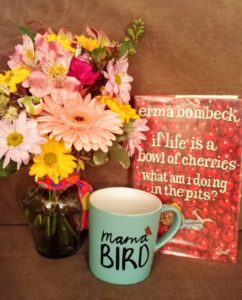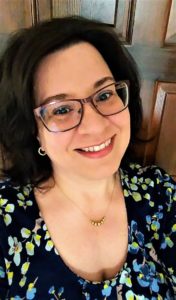 It was summer and, although my mother and I don’t remember exactly how old I was, I was old enough to read and old enough to know better. My mother held the box of effervescent denture tablets in one hand and, in the days before 911, dialed Poison Control on my grandmother’s rotary phone. I stood there stupidly in my grandmother’s kitchen, wondering how soon it would be before I died.
It was summer and, although my mother and I don’t remember exactly how old I was, I was old enough to read and old enough to know better. My mother held the box of effervescent denture tablets in one hand and, in the days before 911, dialed Poison Control on my grandmother’s rotary phone. I stood there stupidly in my grandmother’s kitchen, wondering how soon it would be before I died.
I had a stomach ache and had accidentally downed two of my grandfather’s denture tablets instead of Alka-Seltzer. I could only hear my mother’s side of the phone conversation, but it went something like this:“Yes. Denture tablets. Yes. It’s not funny. It’s not…stop laughing. STOP LAUGHING!” My stomach started to hurt worse than before, and I wondered how mad she would be at me if I died. She slammed the phone down, and then my grandmother asked if they should induce vomiting or if there was anything else to do. My mother said when the operator at Poison Control finished laughing, she told my mother not to worry—I wouldn’t die, but I would definitely have the cleanest esophagus and stomach in town.
This story is funny now, and particularly hilarious to my mother and me. Family humor is its own kind of humor. I was reminded of this recently when I stumbled across a collection of Erma Bombeck books at the library. No one could make me laugh like Bombeck when I was younger, and I felt joyful as I pulled several favorites off the shelf. These books reminded me of summers spent lounging on my grandmother’s white chenille bedspread reading about Bombeck’s life. She was like a sassy neighbor who had troublesome kids. While I enjoyed reading these stories, there was also some youthful smugness on my part. Assured I was a good kid, I laughed to myself thinking that at least I never got into scrapes like Bombeck’s kids did.
Except, I did. And my own mother has the stories to prove it.
Although I don’t have any siblings, I still managed to get into enough trouble on my own. I was a curious kid (both definitions apply here: strange and inquisitive) and spent a lot of time snooping around the house and causing minor mishaps. Long before the denture tablet snafu, I remember stuffing the toilet with toilet paper to see just how much I could flush at once. The bathroom flooded. I finally had the courage to tell my parents this a few years ago. My mother assured me that it wasn’t my fault—it appears my hijinks happened the same time that part of the house flooded due to an overzealous backyard creek. Sheesh, why had I tortured myself for so long?
My mother has the best memory for the funny stuff in our family. I used to think we remembered the same stories differently or that things didn’t happen the way she remembered. The stories she tells me are often hilarious. In fact, no one tells the Poison Control story better. Sometimes, as she recounts these stories, I think that neither I nor the situation could have been that funny. But there is some magical equation about memory through time turning minor amusement into high hilarity in families.
One story that comes up almost every time I visit with my parents is the time I stuffed a harmonica between my cheeks. It made sense to me at the time—why bother holding it between my hands when my mouth would work just as well. It was easy enough to get the harmonica in, but there was no getting it out. We were at their friend’s house for some kind of party and I had been playing well with the kids there. We had a great kid-band going—a toy drum, some kind of kazoo/bugle contraption, a tambourine and the harmonica. It was great, at least, until the harmonica got stuck. I panicked and ran downstairs to ask my parents to help, but the only sound that came out was whooohooosqueewhoo, the harmonica notes replacing my voice. As the adults laughed and laughed I got more and more panicked and the whooohooosqueewhoo became more insistent. Eventually, one of the adults got me to relax enough to pull it out, but I remember my cheeks hurting for days afterward.
For a long time, I couldn’t laugh at myself, so when family members would recount some of these funny stories to me, I thought they were reminding me of all the times I screwed up in my life. The harmonica story was scary when it happened, but now, I can’t help but join in re-enacting what I must have sounded like to the adults. Through time I see the humor in all of these situations and marvel at what a goofy little kid I was.
I have been thinking of these humor-transformed stories more as I teach some workshops on personal writing and memoir. In my own writing, I am often trying to document the major things that happened in my life, but recently I’ve come to think there is more life, and humor, in the spaces between. Like the way my husband and I “fight” about how to properly load a dishwasher. It took me years to stop re-loading the dishwasher after he had already put the dishes in and to laugh about this need I had for dish organization dominance. For Christmas, I found him a T-shirt that proclaims him certified as a Professional Dishwasher Loading Professional, and on our refrigerator there’s a comic of a husband loading the dishwasher as a champion Tetris-player.
As I find my own sense of humor and a greater ability to laugh at myself, I look forward to more balance both in my writing and memory. I’m looking forward to a repeat “performance” of my harmonica mishap when I see my parents this summer.
Stacy Murison is the Writer in Residence at the Flagstaff City – Coconino County Library, funded through the generous support of the Arizona State Library, Archives & Public Records, a division of the Secretary of State, with federal funds from the Institute of Museum and Library Services.

